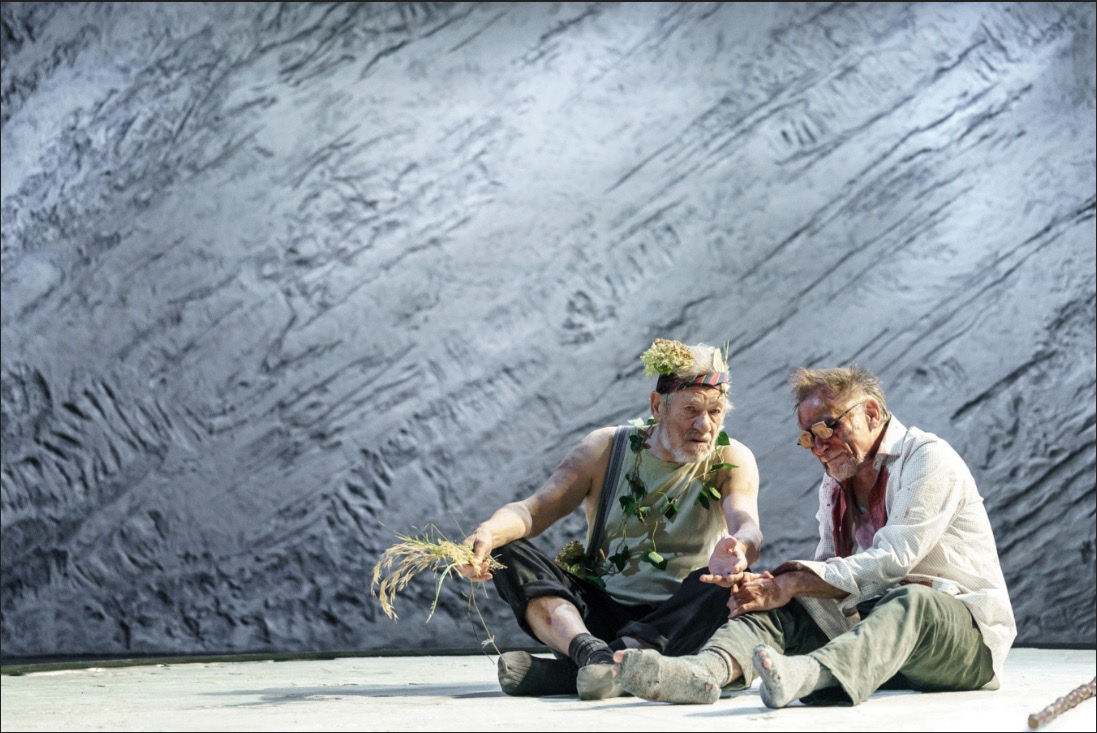Ian McKellen’s Lear is physically and mentally ill from the moment he first appears. He has uncertain, slightly tottery gait. He is in pain and his speech is spat out as if in recovery from a small stoke. It is impeccably observed. So is the capricious mood switching and anger often stressed by the shock and fear shown by everyone around him. And that makes the descent into the storm – a lot of water on the red carpeted circular playing space designed by Paul Wills – even more shocking. The water spreads like an ugly, ever changing amoeba-like map and soon McKellen and his bespectacled, banjo playing Fool (Phil Daniels – good) are ankle deep in it. The wet red floor then does a great job as a butchery with carcases hanging up where the blinding of Gloucester (Danny Webb – moving) is staged at the end of the long, emotionally exhausting first half.
We’re in Britain (mentioned 32 times in the play) and it’s highlighted by flags, soldiers and a rather magnificent, patriotic song (by Ben and Max Ringham) for the opening state scene, backed by a massive Stalin-esque photograph of the King. This is a totalitarian Britain, after all and director, Jonathan Mumby is keen to highlight topical resonances in this modern dress version. They were there in early Jacobean Britain as it struggled to unite in a shaky post-reformation era and they’re there now as we wrestle with what Fergal Keane in his programme essay calls “raging hurricanes, the dysfunctional Trump presidency, and the nuclear stand-off in the Pacific.”
The Minerva is a small space and its intimacy enhances the horror of the family breakdown. Every word is clear, every line is coherent and the play often sounds as if it had been written last week. The wider family of the kingdom is breaking down too as, suddenly there is no leadership. And on an individual level McKellen gives one of the most insightful portrayals of dementia – “madness” – that I have ever seen, one minute incisive and the next dependent. You feel both pity and despair as you watch him self destructing. The “wheel of fire” reconciliation scene with Cordelia (Tamara Lawrance, fresh faced and full of righteous naivety and then mature and loving) takes place in a hospital where briefly he has some hope for the future. It stuns. So does his final scene with Cordelia’s body. Rarely has a standing ovation been so richly deserved.
Amongst the strong supporting cast Sinead Cussack gets exactly the right perceptiveness for the worried, decent Duchess of Kent who then disguises herself as an Irishman in a beany during the long exile. Kirsty Bushell is fabulous as Regan, too. She teeters about giggling manically and is clearly sexually aroused at the blinding of Gloucester. It’s unforgettably nasty and a fine piece of acting. Genius touch, too, to present Lear’s “an hundred knights” as a sort of rowdy on-site Bullingdon club.
Rarely have I felt so elatedly moved and shell shocked at the end of a performance as I did when this King Lear finally reached its devastating conclusion.
Review by Susan Elkin.



